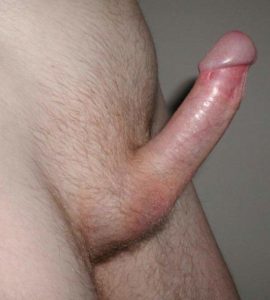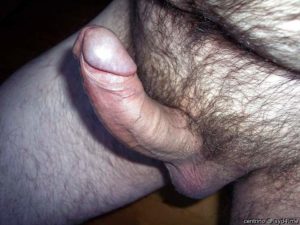Synopsis of Reduced Sensitivity studies
While these studies focus on different aspects of the penis, there are several conclusions which can be reached after reviewing them.
- Because the medical profession (mostly circumcised) universally believed the glans was the defining element of penile sensitivity for many years (and even today large segments of the population believe this), some studies of penile sensitivity have focused on the glans, and ignore other parts of the penis. Studies which focus only on the glans do not accurately determine sensitivity effects of circumcision.
-

Circumcised penis 
Erect penis with frenulum clearly visible Any intact man knows his foreskin is the most sensitive, erogenous part of his penis, and even most circumcised men have a “sweet spot” of sensitivity just below the “V” on the underside of the glans (the last remnant of the frenulum remaining from the inner foreskin), or some left with a larger remnant of the inner foreskin also feel sensitivity just outside the corona of the glans
- Studies which concentrate on the glans to make comparative measurements seem to miss the point that the glans is relatively insensitive. Therefore, studying the sensations of the glans to heat, cold, pressure, touch and pain fails to include the most erogenous nerves of the foreskin, which of course, are almost entirely missing in circumcised men.
- It is only in the last few years that studies have begun to recognize that different areas of the penis have different types of sensitivity, and it is still not fully understood which distinctive areas of the penis play the greatest part in stimulating an ejaculation and in sexual satisfaction.
Treatments and medications to improve penile sensitivity
To my knowledge, there are no defined medical treatment procedures nor any medications specifically developed or prescribed for increasing penile sensitivity.
Therefore, there are no medical studies on the effectiveness of any procedures or medications which might be used to treat this condition.
This means that the medications covered in this section have only anecdotal evidence, no scientific evidence derived from rigorous medical studies.
Nevertheless, there are medications and treatments which do improve the condition.
On this site we explore a number of prescription drugs, as well as non-prescription drugs and treatments. In some combinations these will help improve your penile sensitivity and /or mitigate its effect in virtually any man with the condition.
Every man is different in metabolism, chemistry and receptors which respond to medications. Therefore, the effectiveness of medications is not uniform. In most cases, you will find that two or more medications, used together in some combination, prove to be most effective.
First, a word of caution: Any man who is taking medications for high blood pressure, heart problems, diabetes, liver disease, depression and other brain or nerve disorders, or drugs for liver and glandular disorders, should always check with his appropriate physician to be sure that there will be no serious side-effects affecting his prescriptions.
This goes for both prescription and non-prescription medications covered in this section.
Secondly, be careful not to waste your money on many supplements which offer incredible claims of solving every possible sexual problem.
There are actually a few independent testing groups, which may not have rigorous scientific testing, but nevertheless can separate out supplements which are ineffective.
This author’s personal experience and gathered information on the effectiveness of the medications listed below, is oriented toward treating a lower level of penile sensitivity caused by circumcision.
The studies discussed above do indicate that circumcision lowers penile sensitivity by between 50% and 90% of the intact penis, depending largely on the “tightness” of the circumcision, or the amount of penile foreskin removed.
Additionally, there can be other damage to other areas of the penis in the case of poorly-executed circumcision. Similar damage can occur by unintended trauma to the genitals.
Any decrease in penile sensitivity will almost inevitably further degrade as we age and the body adjusts to lower hormone levels, reduced neural response, and often reduced physical condition.
Lowered penile sensitivity due to other neural or disease causes will also likely respond to some extent, as well.
